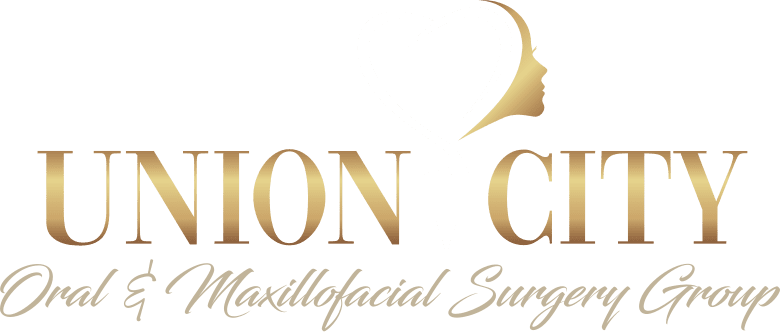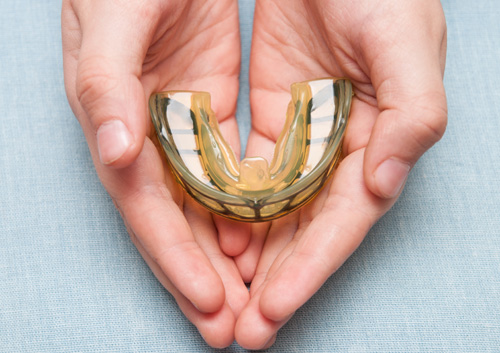You probably know bruxism by its more popular names: teeth grinding or jaw clenching. Unfortunately, this behavior is more than a simple annoyance. Bruxism poses a concrete threat to the health of your teeth, as it can cause jaw pain, headaches, and long-term tooth decay.
It’s always in your best interest to catch and put a stop to bruxism as soon as possible, even if it hasn’t had an immediate impact on your health. The faster you can curb bruxism, the simpler it will be for you to prevent long-term damage. Fortunately, there are several means our team at Union City Oral Surgery Group can recommend that will help you stop grinding your teeth in your sleep.
Night Guards and Bruxism
Night guards and splints work like retainers. They’re custom-designed to fit into your mouth and prevent you from grinding your teeth throughout the night. The barrier between your upper and lower jaw limits the damage done to your teeth, though because the guards don’t stop the actual motion of your jaw, you may still wake up in pain.
Unfortunately, night guards have some drawbacks. If you’re not used to wearing night guards, you may find yourself drooling more than usual during your first few uses. You also need to take particular care to clean and protect your mouth guard, or else you risk exposing yourself to bacteria.
Dental Correction and Bruxism
If you have an uneven jaw or ended up with misaligned jawbones after an accident, you may have the opportunity to explore dental corrective surgeries. Dental correction can see oral surgeons reshape your jaw, moving it forward or backward so your upper and lower mandibles align. Some surgeries even allow oral surgeons to reshape your teeth.
Notably, you don’t have to commit to a surgery to invest in dental corrections. Braces can help fix slight misalignments, usually over a considerable period of time.
Botox and Bruxism
While Botox made a name for itself as a wrinkle aid, it can also temporarily prevent people from clenching their jaws or grinding their teeth. Botox shots paralyze the muscles of the face and make it easier for those muscles to relax as the shot wears off.
Most Botox bruxism treatments see patients receive their shots in the muscles of their jaw, often those responsible for chewing, or the frontalis or temporalis muscles. You can discuss where you’d like a shot when you meet with a professional to discuss the pros and cons of Botox in bruxism treatments.
Notably, most shots take one to three days to begin impacting your pain and chewing habits. The shots wear off entirely within six months of initial treatment. If you’re looking for a longer-term solution to your bruxism, you may want to explore the use of Botox in tandem with other anti-teeth grinding solutions.
Psychological Treatments and Bruxism
Some psychologists believe that bruxism stems from stress and other mental factors. If you’re interested in curbing your subconscious teeth grinding habit, you could pair psychological solutions to bruxism with medical assistance.
Some of the most common psychological treatments recommended for bruxism treatment include the following:
- Stress management, including breathing exercises, yoga, meditation, and stress-reducing practices or life changes
- Cognitive-behavioral therapy, a psychological practice that addresses stressful or harmful thought patterns before working to correct them
- Biofeedback, or the purposeful reduction of your body’s tension
Notably, people with mild cases of bruxism may be able to stop grinding their teeth entirely with psychological assistance. However, if you’re noticing significant dental damage, it’s in your best interest to pair these practices with medical attention.
Medications and Bruxism
There are also some medications that can alleviate the symptoms of bruxism or stop the practice entirely. Some of the most common include the following:
- Muscle relaxants
- Anxiety medications
- Depression medications
You can work with medical professionals to determine whether or not these medications may have a positive impact on your bruxism practice. That said, as with psychological assistance, these practices will not heal damaged teeth. If you’re struggling with significant jaw pain or tooth damage, get in touch with an oral surgeon as soon as possible.
Talk to Your Oral Surgeon About Bruxism’s Impact on Your Health
If you let bruxism go unaddressed for a considerable amount of time, you put the health of your teeth and jaw at considerable risk. Don’t let your opportunity to protect your long-term health slip away from you. If you’re struggling to control your nightly bruxism, an oral surgeon from Union City Oral Surgery Group can break down possible solutions that may help you reduce or stop the behavior entirely.
You can call (201) 601-9262 or contact us online to learn more about the services we offer to address our patients’ bruxism.


